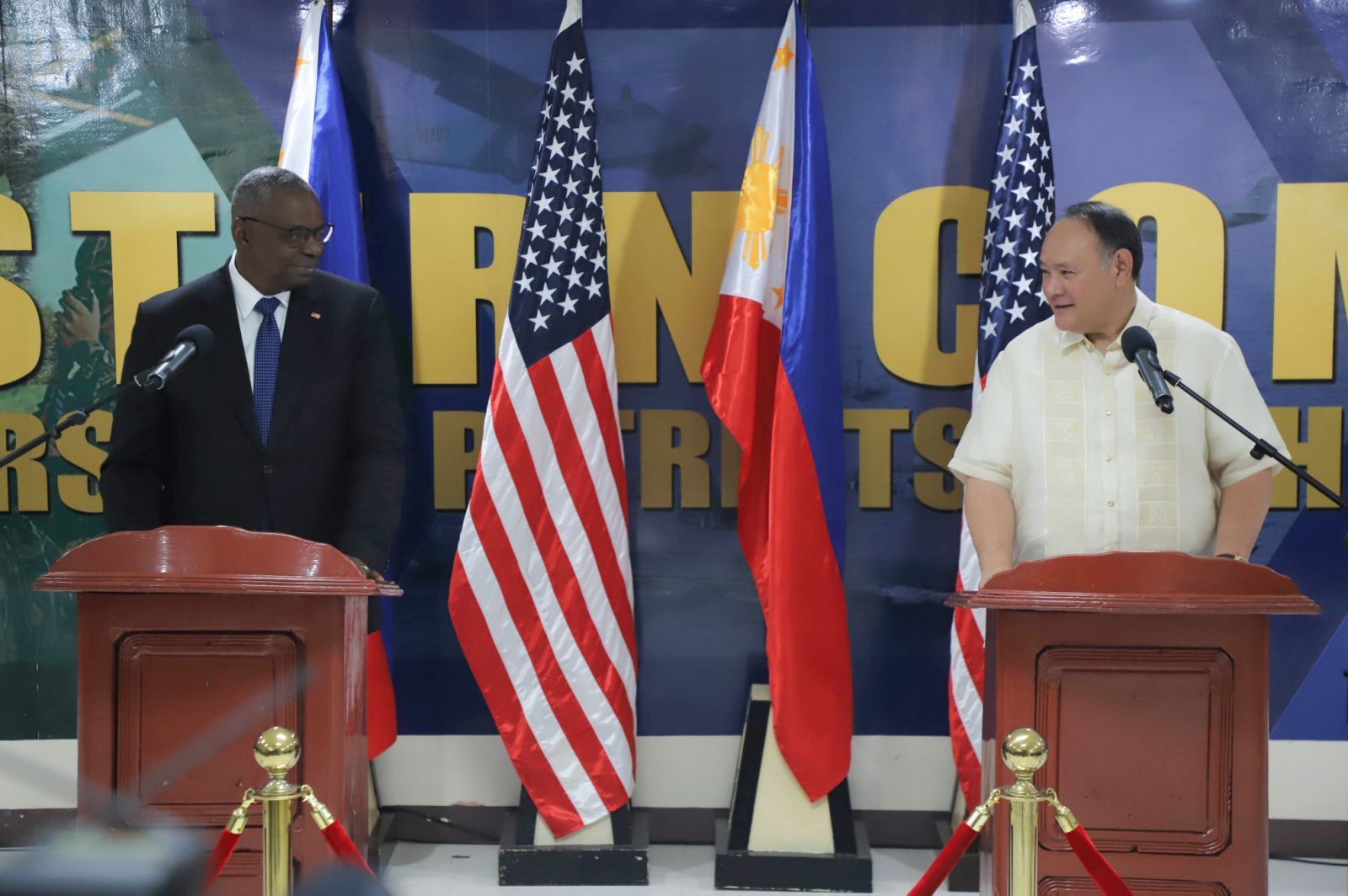America is 'profoundly committed' to PH's defense – Austin
DND chief Gilberto Teodoro Jr. takes swipe at 'paranoid' China

The United States of America reiterated its commitment to helping the Philippines develop its military capabilities so the latter could better protect its interests in the West Philippine Sea (WPS).
United States Secretary of Defense Lloyd Austin III made the commitment to Department of National Defense (DND) Sec. Gilberto Teodoro Jr. during their visit to the headquarters of the Western Command (Wescom) in Puerto Princesa City, Palawan on Tuesday, Nov. 19.
Austin’s plane landed at the Antonio Bautista Air Base, one of the nine Enhanced Defense Cooperation Agreement (EDCA) sites in the country.
“America is profoundly committed to the defense of the Philippines. Our commitment to the Mutual Defense Treaty (MDT) is ironclad,” Austin said in a press conference shortly after his meeting with officials of Wescom led by Vice Adm. Alfonso F. Torres Jr.
The MDT is a defense agreement signed by Manila and Washington in 1951 which requires both countries to defend each other in case of an armed attack from a third-party country in the Pacific.
Austin underscored the critical role that the EDCA sites have been playing not only in the defense of the country but also in humanitarian assistance and disaster relief operations (HADR).
“These EDCA sites have been critical to delivering aid during disaster relief operations,” he noted.
During his visit to the Wescom, the unified command of the Armed Forces of the Philippines (AFP) that is in-charge of military operations in the WPS, Austin was briefed by Admiral Torres of the current operating environment in Palawan.
The US defense chief also witnessed a capability demonstration of the Philippine Navy (PN) featuring the T12 unmanned surface vessel, one of the several unmanned capabilities that the US has provided to the PN through Foreign Military Financing (FMF). Such capabilities are instrumental to advance the AFP’s intelligence, surveillance and reconnaissance (ISR) and maritime domain awareness (MDA) capabilities.
“We expect to see many more platforms like this delivered with USD500 million in Foreign Military Financing that I announced during my visit to the Philippines in July to help ensure that the Philippines has the capabilities that it needs to defend its rights and its sovereignty throughout its exclusive economic zone,” he stated.
“Our cooperation continues to grow. That means deeper information sharing, combined maritime activities, and we can do even more in the future,” the US official added.
Austin and Teodoro also visited a bilateral Command and Control (C2) Fusion Center, one of several facilities built by the US Indo-Pacific Command (Indopacom) in the Philippines to enhance information sharing between forces from the two nations.
Teodoro hits ‘paranoid’ China
Meanwhile, Teodoro took a swipe at China for commenting about the recently signed military information-sharing agreement by the Philippines and United States.
To further boost the defense cooperation of the treaty allies, Austin and Teodoro signed on Monday the General Security of Military Information Agreement (GSOMIA), which will serve as a framework to facilitate the exchange of classified military information between the Philippines and United States, and broke ground for the Combined Coordination Center (CCC) which will serve as hub that enables real-time information sharing between the AFP and United States Armed Forces.
This is in response to China’s increasing assertiveness in the South China Sea (SCS) as it continues to claim areas within the 200-nautical mile exclusive economic zone (EEZ) of the Philippines, including the WPS.
“It’s the same story over and over again. They have been more aggressive in denying us access to our exclusive economic zone in the West Philippine Sea,” Teodoro said.
“They have been very aggressive in their information operations based in the Philippines so much so that even the [signing of the] General Security of Military Information Agreement, they have a comment about it," he added.
Following the signing of GSOMIA, China’s Foreign Ministry spokesperson Lin Jian said in a press conference in Beijing that no military agreement, or defense and security cooperation, in whatever form, "should target any third-party or harm the interests of any third party, nor should it undermine regional peace or exacerbate regional tensions".
But Teodoro responded that China should stop its paranoia.
"If you are not paranoid, you wouldn’t comment about it because it is something bilateral between the United States and the Philippines,” he said.
The DND chief fired back at Beijing, saying it was the one that placed “pseudo-military vessels” disguised as coast guard vessels and maritime militia vessels in the WPS to prevent the AFP from patrolling certain contested features and discourage Filipino fishermen from catching fish in their traditional fishing grounds.
“All of these actions, to me, prove the existence of some motive which is brought about by close political system where the external controls the internal political environment. In so far as the Philippines is concerned in partnership with the United States, our main theme of cooperation here, aside from being treaty allies, stands firm – upholding of international law and fundamental values of freedom and democracy,” Teodoro said.